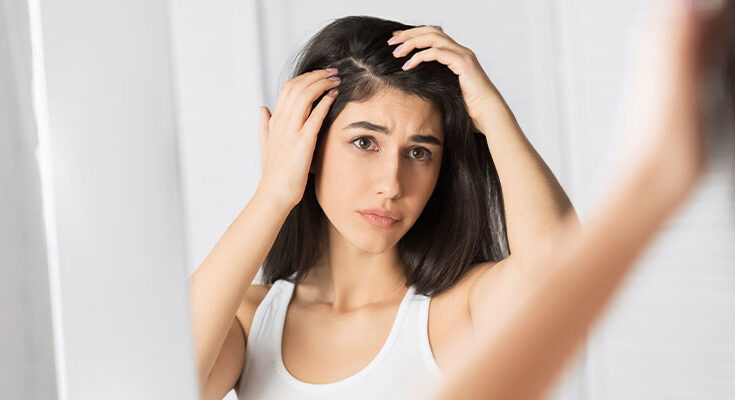Dandruff Treatment: Dandruff is a common scalp condition marked by flaking and sometimes mild itchiness. This can lead to social or self-esteem problems, making diagnosis and treatment an important endeavor for many.
Understanding the causes, identifying the condition, and knowing the most effective treatments can significantly improve the quality of life for those affected.
Understanding Dandruff
Dandruff is a common scalp condition that affects millions of people worldwide, characterized by the presence of flakes and often accompanied by itching. Understanding its symptoms, causes, and how it affects both scalp health and personal confidence is essential for effective management and treatment.
Symptoms of Dandruff
- White or Yellow Flakes: The most noticeable symptom of dandruff is the appearance of white or yellow flakes on the scalp. These flakes can also be seen on the shoulders and hair.
- Itchy Scalp: Many people with dandruff experience an itchy scalp, which can range from mild to severe.
- Redness and Irritation: In some cases, the scalp may become red and irritated, particularly in severe dandruff or related conditions like seborrheic dermatitis.
- Dry Scalp: Dandruff often leads to a feeling of dryness on the scalp, though it’s worth noting that oily scalps are also prone to dandruff.
- Oily Patches on the Scalp: For some, dandruff comes with oily patches on the scalp along with the flakes.
Common Causes of Dandruff
- Seborrheic Dermatitis: This is one of the most common causes of dandruff, characterized by oily and irritated skin.
- Malassezia: A yeast-like fungus that can grow on the scalp and cause skin cells to grow and die off faster, leading to flakes.
- Dry Skin: Flakes from dry skin are smaller and less oily than those from other causes of dandruff.
- Sensitivity to Hair Care Products: Some people may react to certain hair care products or hair dyes, leading to a dandruff-like condition.
- Other Skin Conditions: Conditions like psoriasis and eczema can also present symptoms similar to dandruff.
How Dandruff Affects Scalp Health and Personal Confidence
- Impact on Scalp Health: Dandruff can lead to a vicious cycle of scalp irritation, scratching, and further damage to the scalp’s skin barrier. This can exacerbate the flaking and itching, making the condition worse over time.
- Impact on Personal Confidence: The visibility of flakes can lead to embarrassment and social anxiety for many individuals. The persistent itchiness and discomfort can also detract from daily activities and overall quality of life.
Effective management of dandruff involves not only medical treatments but also lifestyle changes to address the underlying causes and minimize its impact.
Diagnosis of Dandruff
This article will guide you through recognizing persistent dandruff, the role of health professionals in its diagnosis, and the standard diagnostic procedures employed.
When to Seek Help: Recognizing Persistent Dandruff
Dandruff may initially seem like a minor inconvenience; however, persistent or severe symptoms warrant professional advice. If you notice excessive flaking, redness, irritation, or if the scalp flakes are oily and yellow, which could indicate seborrheic dermatitis, a more severe form of dandruff, it’s time to seek help. Additionally, if over-the-counter dandruff shampoos and treatments have little to no effect after a few weeks of use, consulting a healthcare provider is recommended. These signs suggest that your dandruff may be more than a simple scalp issue and could be symptomatic of underlying health conditions that require medical attention.
Health Professionals and Their Role in Diagnosing Dandruff
Dermatologists and other healthcare providers play a crucial role in diagnosing and treating dandruff. They are equipped to differentiate between common dandruff and more serious scalp conditions such as psoriasis, fungal infections, or eczema. A detailed medical history and understanding of your lifestyle will help them rule out external factors such as product use or dietary influences that could contribute to the condition.
Diagnostic Procedures: From Visual Examination to Skin Tests
The diagnosis of dandruff usually begins with a thorough visual examination of the scalp. Your healthcare provider will look for signs of flaking, redness, and scaling. In some cases, they might use a dermatoscope, a specialized tool that provides a magnified view of the scalp, to examine the skin more closely.
If the cause of dandruff is not immediately apparent, further tests may be conducted to rule out other conditions. These could include:
- Skin Biopsy: A small sample of skin might be taken to examine under a microscope. This test can help identify or rule out other skin conditions.
- Fungal Culture: If a fungal infection is suspected, a sample of scalp flakes may be sent for culture to identify the specific fungus causing the problem.
- Patch Testing: This is used to determine if allergic reactions to hair care products or environmental factors are causing dandruff.
Understanding the underlying cause of dandruff is essential for effective treatment. Health professionals may recommend specialized treatments based on the diagnosis, which could include medicated shampoos, topical steroids, antifungals, or lifestyle changes.
Persistent dandruff that doesn’t improve with over-the-counter treatments should be evaluated by a healthcare provider. Professional diagnosis and treatment can alleviate symptoms and improve scalp health. By recognizing the signs that it’s time to seek help and understanding the diagnostic process, individuals can take proactive steps towards managing dandruff effectively.
Traditional Treatments for Dandruff
This article will delve into the conventional methods for treating dandruff, focusing on the efficacy of shampoos and topical agents, and highlighting the ingredients to look for in these products. Additionally, we will explore the critical role that medicated shampoos play in dandruff treatment, providing readers with a comprehensive understanding of how to combat this scalp issue effectively.
Overview of Conventional Dandruff Treatments
Conventional treatments for dandruff primarily involve the use of over-the-counter (OTC) shampoos and topical agents designed to reduce scalp flaking and irritation. These products work by targeting the underlying causes of dandruff, such as fungal growth on the scalp, excess oil production, and skin cell buildup. By addressing these issues, traditional treatments can significantly alleviate the symptoms of dandruff, leading to an improved scalp condition and reduced flakiness.
Shampoos and Topical Agents: Ingredients to Look For
When selecting a shampoo or topical agent for dandruff treatment, it is crucial to consider the active ingredients. These ingredients are the backbone of the product’s effectiveness and can vary widely in their action against dandruff. Key ingredients to look for include:
- Zinc Pyrithione: This antibacterial and antifungal agent is effective against the fungus that causes dandruff.
- Selenium Sulfide: Helps reduce the production of natural oils by glands in the scalp and is effective in treating more severe cases of dandruff.
- Salicylic Acid: Works by removing dead skin cells from the scalp and reducing scaling.
- Ketoconazole: An antifungal agent that fights the fungus responsible for dandruff, suitable for all ages.
- Coal Tar: Slows down the growth of skin cells on the scalp, thus reducing flakiness and itchiness.
The Role of Medicated Shampoos in “Dandruff Treatment”
Medicated shampoos play a pivotal role in the treatment of dandruff. Unlike regular shampoos, which primarily cleanse the scalp, medicated shampoos contain specific active ingredients aimed at treating the root causes of dandruff. These shampoos are designed to perform multiple functions, including killing the fungus responsible for dandruff, slowing down the rate at which skin cells die, and reducing scalp oiliness. The choice of a medicated shampoo should be based on the severity of the dandruff and the individual’s scalp condition. In more severe cases, a dermatologist may recommend a prescription-strength shampoo or topical treatment.
However, traditional treatments for dandruff, particularly the use of shampoos and topical agents with specific active ingredients, have proven to be effective in managing this condition. Understanding the key ingredients and their functions can help individuals make informed decisions about the products they use. Furthermore, recognizing the importance of medicated shampoos in treating dandruff is crucial for achieving optimal scalp health. With the right approach, it is possible to control dandruff effectively and maintain a healthy, flake-free scalp.
Alternative and Home Remedies for Dandruff
From natural ingredients to simple lifestyle adjustments, let’s delve into the world of alternative solutions for dandruff, their effectiveness, and when it might be time to seek professional treatment.
Natural Remedies and Their Effectiveness
Tea Tree Oil: Known for its antimicrobial and anti-inflammatory properties, tea tree oil has been found to significantly reduce dandruff severity. Applying a few drops to your shampoo or scalp can help alleviate symptoms, but it’s important to patch test first to avoid allergic reactions.
Coconut Oil: This natural moisturizer can help improve skin hydration and reduce dryness, which may diminish dandruff. A weekly coconut oil mask can soothe your scalp and boost hair health.
Apple Cider Vinegar: Its acidity is believed to help stimulate the shedding of dead skin cells on the scalp. Dilute apple cider vinegar with water, apply it to the scalp, and rinse after a few minutes for a potential pH balance restoration.
Aloe Vera: Renowned for its soothing properties, aloe vera can calm an itchy scalp and provide relief from dandruff. Apply pure aloe vera gel directly to the scalp before washing your hair.
It’s essential to note that while these remedies can offer relief, their effectiveness varies from person to person. Incorporating them gradually and monitoring your scalp’s response is key to identifying what works best for you.
Lifestyle Changes to Reduce Dandruff
Dietary Adjustments: Incorporating more omega-3s, zinc, and B vitamins into your diet can support scalp health and potentially reduce dandruff.
Stress Management: High stress levels can exacerbate dandruff, making relaxation techniques like yoga, meditation, or regular exercise beneficial for both your mind and scalp.
Hair Care Routine: Washing your hair more frequently can help remove dandruff flakes and reduce oil accumulation. Opting for gentle, sulfate-free shampoos and avoiding harsh styling products can also minimize scalp irritation.
Precautions and When to Opt for Professional Treatment
While home remedies are effective for many, they’re not a one-size-fits-all solution. It’s crucial to proceed with caution, especially if you have sensitive skin or a severe scalp condition. Discontinue any remedy that causes irritation or allergic reactions.
If your dandruff persists despite trying various home treatments, or if you notice redness, severe itching, or signs of infection, it may be time to seek professional advice. Dermatologists can offer specialized treatments, such as medicated shampoos or scalp treatments, tailored to your specific needs.
Exploring alternative and home remedies for dandruff can be a valuable part of your scalp care regimen. By understanding the natural solutions available, making simple lifestyle adjustments, and knowing when to seek professional help, you can take significant steps towards managing dandruff effectively. Remember, what works for someone else may not work for you, so patience and experimentation are key to finding your best solution.
Advanced Dandruff Treatments: Unlocking the Latest Solutions
Now, let’s delves into the latest advancements in dandruff treatment, including prescription medications and light therapy, while emphasizing the importance of consulting with a dermatologist.
Exploring Prescription Medications
For individuals who find over-the-counter shampoos and treatments ineffective, prescription medications offer a stronger line of defense against dandruff. These medications are formulated to target the root causes of dandruff, such as yeast overgrowth on the scalp, inflammation, and excessive skin cell production. Two main types of prescription treatments include:
- Topical Steroids: These are used to reduce inflammation and itchiness associated with severe dandruff. They can be highly effective but are usually recommended for short-term use due to potential side effects with long-term application.
- Antifungal Shampoos and Lotions: Prescription-strength antifungal treatments contain higher concentrations of active ingredients than their over-the-counter counterparts. They work by directly combating the yeast responsible for dandruff, leading to more rapid and sustained improvements.
The Role of Light Therapy
Light therapy, also known as phototherapy, has emerged as a novel approach to treating various skin conditions, including dandruff. This treatment involves exposing the scalp to specific wavelengths of light, typically ultraviolet light, to help reduce inflammation and slow down the overproduction of skin cells. Light therapy sessions are conducted under the guidance of a dermatologist, ensuring safe and effective application. While not universally available, light therapy represents a promising option for those who have not found relief through traditional means.
Consulting with a Dermatologist: A Crucial Step
Navigating the options for advanced dandruff treatment can be overwhelming. This is where the expertise of a dermatologist becomes invaluable. A dermatologist can provide a comprehensive evaluation of your scalp condition, taking into account your medical history, severity of symptoms, and previous treatment responses. This personalized approach ensures that you receive the most appropriate and effective treatment plan.
A consultation with a dermatologist also allows for the discussion of potential side effects and the monitoring of treatment progress. It’s important to remember that what works for one individual may not work for another, making professional guidance crucial.
By seeking their advice, individuals can embark on a tailored treatment journey, unlocking the path to a healthier scalp and improved quality of life. Embrace the latest in dandruff treatment and consult with a dermatologist to discover the best approach for your unique situation.
Preventing Dandruff: Tips and Strategies
Dandruff can be an embarrassing and often persistent issue, but with the right strategies, you can significantly reduce its occurrence or even prevent it altogether. Below are some effective tips and strategies divided into key areas: daily scalp care routines, the impact of diet and nutrition on scalp health, and the role of stress management in preventing dandruff. By adopting a holistic approach, you can tackle dandruff from multiple angles, ensuring a healthier scalp and hair.
Daily Scalp Care Routines to Prevent Dandruff
A consistent scalp care routine is essential for maintaining scalp health and preventing dandruff. Here are some daily practices to incorporate:
- Gentle Cleansing: Use a mild, pH-balanced shampoo to cleanse your scalp regularly but avoid overwashing, which can strip your scalp of its natural oils, leading to dryness and irritation.
- Moisturizing: After washing your hair, apply a lightweight, hydrating conditioner to keep your scalp moisturized. Look for products containing tea tree oil or coconut oil, known for their anti-dandruff properties.
- Exfoliating: Use a scalp scrub once a week to gently remove dead skin cells and product buildup, which can contribute to dandruff.
- Choosing the Right Products: Select hair care products suitable for your scalp type (oily, dry, or combination). Avoid products with harsh chemicals that can irritate the scalp.
Diet and Nutrition: Their Impact on Scalp Health
What you eat plays a crucial role in the health of your scalp and hair. Nutrient-rich foods can provide the vitamins and minerals needed for a healthy scalp, reducing the risk of dandruff:
- Omega-3 Fatty Acids: Foods rich in omega-3s, like salmon, flaxseeds, and walnuts, can help moisturize the scalp from the inside out, reducing dryness and flakiness.
- Zinc and B-Vitamins: Zinc and B-vitamins are essential for hair health. Foods like beef, spinach, and chickpeas are excellent sources and can help prevent dandruff.
- Stay Hydrated: Drinking plenty of water ensures your skin, including your scalp, stays hydrated, which is essential for preventing dryness and flakiness.
Stress Management and Its Role in Preventing Dandruff
Stress can exacerbate scalp issues, including dandruff, by triggering hormonal imbalances and weakening the immune system. Implementing stress reduction techniques can thus be a critical component of dandruff prevention:
- Regular Exercise: Physical activity helps reduce stress levels, improving overall health and potentially reducing the severity of dandruff.
- Mindfulness and Relaxation Techniques: Practices like meditation, yoga, and deep breathing exercises can help manage stress, benefiting your scalp health.
- Adequate Sleep: Ensuring you get enough restful sleep each night can help reduce stress and its negative effects on the scalp.
Remember, consistency is key, and it may take some time to see significant changes. If your dandruff persists or worsens, consider consulting a dermatologist for personalized advice and treatment options.
Finding the Right Dandruff Treatment for You
This guide will help you understand how to choose the appropriate treatment based on your condition, emphasize the importance of patience and consistency, and advise on when it might be time to change your dandruff treatment strategy.
How to Choose the Right Treatment Based on Your Condition
The first step in selecting the right dandruff treatment is understanding the underlying cause of your dandruff. Dandruff can be caused by dry skin, sensitivity to hair products, or a yeast-like fungus called Malassezia. Each cause may require a different approach to treatment:
- For Dry Skin: Look for moisturizing shampoos that hydrate your scalp and reduce flakiness.
- For Product Sensitivity: Switch to hypoallergenic and fragrance-free hair care products.
- For Fungal Causes: Anti-fungal shampoos containing ingredients like ketoconazole, selenium sulfide, or zinc pyrithione can be effective.
Consider your hair type and any scalp conditions you may have, such as psoriasis or eczema, which could influence your treatment choice. Consulting with a dermatologist can also provide personalized advice tailored to your specific situation.
The Importance of Patience and Consistency in Treatment
Finding the right dandruff treatment is often a game of patience and consistency. It’s important to give each new treatment enough time to work, usually around a month, before determining its effectiveness. Consistently using the selected treatment as directed is key to managing dandruff effectively. Skipping applications or frequently changing products can interfere with the treatment’s success and may exacerbate your symptoms.
When to Change Your Dandruff Treatment Strategy
It may be time to reconsider your dandruff treatment strategy if:
- You’ve Given It Time: If you’ve used a product consistently for several weeks with no improvement, it might not be the right solution for your type of dandruff.
- Symptoms Worsen: Any increase in flakiness, redness, or irritation is a sign that the current treatment may not be suitable for you.
- Scalp Conditions Change: Changes in your scalp’s condition or overall health may necessitate a different approach to treatment.
In such cases, reassessing your scalp’s needs and possibly consulting with a healthcare professional can guide you towards a more effective treatment plan.
FAQs on Dandruff and Its Treatment
1. What causes dandruff?
Dandruff is primarily caused by a fungus called Malassezia, which lives on the scalp of most people. However, for some, it can irritate the scalp and cause more skin cells to grow. When these skin cells die, they turn into white flakes. Other factors contributing to dandruff include dry skin, sensitivity to hair products (contact dermatitis), and other skin conditions like eczema or psoriasis.
2. How can I tell if I have dandruff?
Dandruff is characterized by white flakes of skin on the scalp and in the hair. Symptoms also include itching, redness, and irritation of the scalp. If you notice these signs, you likely have dandruff.
3. Are there different types of dandruff?
Yes, there are mainly two types: dry dandruff and oily dandruff. Dry dandruff presents as loose white flakes that fall off the hair easily. Oily dandruff is characterized by larger, greasier flakes that stick to the scalp and hair.
4. Can dandruff be cured?
While there’s no permanent cure for dandruff, it can be effectively managed and controlled with the right treatment. Regular use of anti-dandruff shampoos and scalp treatments can reduce flaking, itching, and irritation.
5. What are the best treatments for dandruff?
The best treatment depends on your skin type and the severity of your dandruff. Over-the-counter (OTC) anti-dandruff shampoos containing ingredients like ketoconazole, zinc pyrithione, selenium sulfide, salicylic acid, and coal tar can be effective. For severe cases, a dermatologist may prescribe stronger treatments.
6. How often should I wash my hair if I have dandruff?
Washing your hair too often or not enough can worsen dandruff. Most experts recommend washing your hair with anti-dandruff shampoo two to three times a week. However, you may need to adjust this frequency based on your scalp’s response and oil production.
7. Can lifestyle changes help with dandruff?
Yes, lifestyle changes can positively impact dandruff management. Reducing stress, eating a balanced diet rich in zinc and B vitamins, and avoiding excessive hair styling products can help minimize dandruff flare-ups.
8. Is dandruff contagious?
No, dandruff is not contagious. You cannot catch it from someone else, nor can you pass it on to others.
9. Can natural remedies be effective against dandruff?
Some people find relief using natural remedies like tea tree oil, coconut oil, apple cider vinegar, and aloe vera. These can have anti-inflammatory and antifungal properties that may help reduce dandruff. However, they may not work for everyone, and it’s important to patch test any new remedy to avoid adverse reactions.
10. When should I see a doctor about my dandruff?
If over-the-counter treatments are not effective, or if your scalp becomes red, sore, or infected, you should see a dermatologist. You may require prescription treatment or have a different condition that resembles dandruff.
Conclusion
In wrapping up our discussion on the significance of accurately diagnosing and effectively treating dandruff, it’s crucial to reiterate the profound impact that this common scalp condition can have on both physical well-being and self-esteem. Dandruff, characterized by flaking and sometimes an itchy scalp, is not just a minor inconvenience; it’s a condition that requires proper attention and care. Understanding the root causes, whether they be dry skin, sensitivity to hair products, or a specific skin condition like seborrheic dermatitis, is the first step towards finding an effective treatment.
We strongly encourage anyone struggling with dandruff to seek professional advice. Consulting with a dermatologist or a trichologist can provide you with a personalized “Dandruff Treatment” plan tailored to your specific needs and conditions. These professionals can offer insights beyond over-the-counter solutions, possibly recommending prescription treatments, lifestyle changes, or specialized hair care routines that you might not have considered.
Living dandruff-free is more than just about eliminating white flakes; it’s about restoring confidence and comfort in your own skin. The journey to a healthy scalp is also a step towards boosting personal confidence, allowing you to focus more on your daily activities and less on the discomfort and self-consciousness dandruff can cause.
Remember, while dandruff can be persistent and sometimes frustrating to deal with, it’s also manageable with the right approach and care. By seeking professional guidance and adopting a suitable treatment plan, you can overcome dandruff, leading to not only a healthier scalp but also a happier, more confident you.



